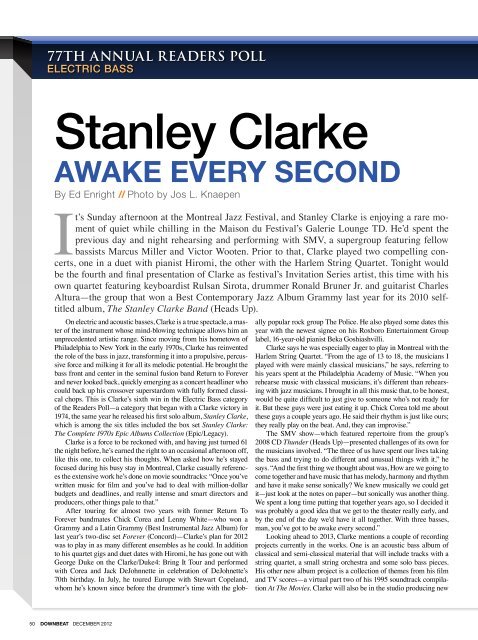Ron Carter Esperanza Spalding - Downbeat
Ron Carter Esperanza Spalding - Downbeat
Ron Carter Esperanza Spalding - Downbeat
You also want an ePaper? Increase the reach of your titles
YUMPU automatically turns print PDFs into web optimized ePapers that Google loves.
77th Annual readers Poll<br />
electric bass<br />
Stanley Clarke<br />
awake every second<br />
By Ed Enright // Photo by Jos L. Knaepen<br />
It’s Sunday afternoon at the Montreal Jazz Festival, and Stanley Clarke is enjoying a rare moment<br />
of quiet while chilling in the Maison du Festival’s Galerie Lounge TD. He’d spent the<br />
previous day and night rehearsing and performing with SMV, a supergroup featuring fellow<br />
bassists Marcus Miller and Victor Wooten. Prior to that, Clarke played two compelling concerts,<br />
one in a duet with pianist Hiromi, the other with the Harlem String Quartet. Tonight would<br />
be the fourth and final presentation of Clarke as festival’s Invitation Series artist, this time with his<br />
own quartet featuring keyboardist Rulsan Sirota, drummer <strong>Ron</strong>ald Bruner Jr. and guitarist Charles<br />
Altura—the group that won a Best Contemporary Jazz Album Grammy last year for its 2010 selftitled<br />
album, The Stanley Clarke Band (Heads Up).<br />
On electric and acoustic basses, Clarke is a true spectacle, a master<br />
of the instrument whose mind-blowing technique allows him an<br />
unprecedented artistic range. Since moving from his hometown of<br />
Philadelphia to New York in the early 1970s, Clarke has reinvented<br />
the role of the bass in jazz, transforming it into a propulsive, percussive<br />
force and milking it for all its melodic potential. He brought the<br />
bass front and center in the seminal fusion band Return to Forever<br />
and never looked back, quickly emerging as a concert headliner who<br />
could back up his crossover superstardom with fully formed classical<br />
chops. This is Clarke’s sixth win in the Electric Bass category<br />
of the Readers Poll—a category that began with a Clarke victory in<br />
1974, the same year he released his first solo album, Stanley Clarke,<br />
which is among the six titles included the box set Stanley Clarke:<br />
The Complete 1970s Epic Albums Collection (Epic/Legacy).<br />
Clarke is a force to be reckoned with, and having just turned 61<br />
the night before, he’s earned the right to an occasional afternoon off,<br />
like this one, to collect his thoughts. When asked how he’s stayed<br />
focused during his busy stay in Montreal, Clarke casually references<br />
the extensive work he’s done on movie soundtracks: “Once you’ve<br />
written music for film and you’ve had to deal with million-dollar<br />
budgets and deadlines, and really intense and smart directors and<br />
producers, other things pale to that.”<br />
After touring for almost two years with former Return To<br />
Forever bandmates Chick Corea and Lenny White—who won a<br />
Grammy and a Latin Grammy (Best Instrumental Jazz Album) for<br />
last year’s two-disc set Forever (Concord)—Clarke’s plan for 2012<br />
was to play in as many different ensembles as he could. In addition<br />
to his quartet gigs and duet dates with Hiromi, he has gone out with<br />
George Duke on the Clarke/Duke4: Bring It Tour and performed<br />
with Corea and Jack DeJohnnette in celebration of DeJohnette’s<br />
70th birthday. In July, he toured Europe with Stewart Copeland,<br />
whom he’s known since before the drummer’s time with the globally<br />
popular rock group The Police. He also played some dates this<br />
year with the newest signee on his Roxboro Entertainment Group<br />
label, 16-year-old pianist Beka Goshiashvilli.<br />
Clarke says he was especially eager to play in Montreal with the<br />
Harlem String Quartet. “From the age of 13 to 18, the musicians I<br />
played with were mainly classical musicians,” he says, referring to<br />
his years spent at the Philadelphia Academy of Music. “When you<br />
rehearse music with classical musicians, it’s different than rehearsing<br />
with jazz musicians. I brought in all this music that, to be honest,<br />
would be quite difficult to just give to someone who’s not ready for<br />
it. But these guys were just eating it up. Chick Corea told me about<br />
these guys a couple years ago. He said their rhythm is just like ours;<br />
they really play on the beat. And, they can improvise.”<br />
The SMV show—which featured repertoire from the group’s<br />
2008 CD Thunder (Heads Up)—presented challenges of its own for<br />
the musicians involved. “The three of us have spent our lives taking<br />
the bass and trying to do different and unusual things with it,” he<br />
says. “And the first thing we thought about was, How are we going to<br />
come together and have music that has melody, harmony and rhythm<br />
and have it make sense sonically? We knew musically we could get<br />
it—just look at the notes on paper—but sonically was another thing.<br />
We spent a long time putting that together years ago, so I decided it<br />
was probably a good idea that we get to the theater really early, and<br />
by the end of the day we’d have it all together. With three basses,<br />
man, you’ve got to be awake every second.”<br />
Looking ahead to 2013, Clarke mentions a couple of recording<br />
projects currently in the works. One is an acoustic bass album of<br />
classical and semi-classical material that will include tracks with a<br />
string quartet, a small string orchestra and some solo bass pieces.<br />
His other new album project is a collection of themes from his film<br />
and TV scores—a virtual part two of his 1995 soundtrack compilation<br />
At The Movies. Clarke will also be in the studio producing new<br />
50 DOWNBEAT DECEMBER 2012
















